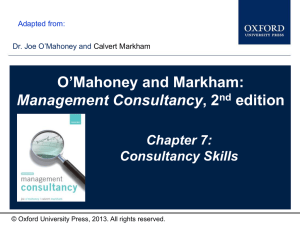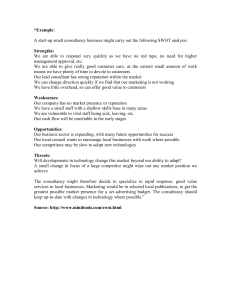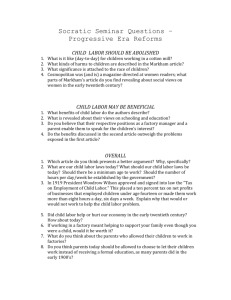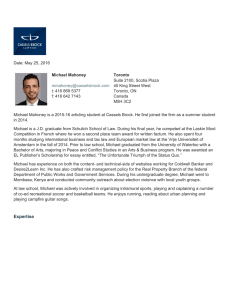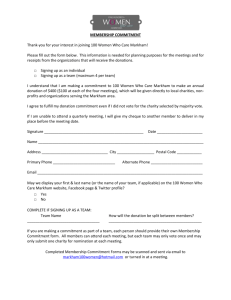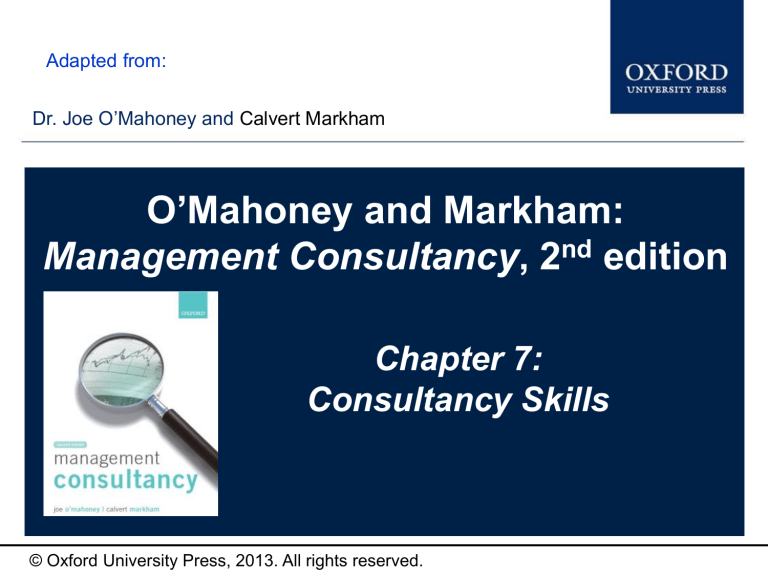
Adapted from: Type Dr. Joe author O’Mahoney names and hereCalvert Markham O’Mahoney and Markham: Management Consultancy, 2nd edition Chapter 7: Consultancy Skills © Oxford University Press, 2013. All rights reserved. Chapter Objectives By the end of this lesson, you will : • Know the skills needed by a consultant that are different from any other managerial occupation. • Understand the challenges of working in a consulting role. • Recognise the three key processes in consulting: selling the work, delivering the work, and managing a consulting business. • Understand how consultants should manage their time and set priorities for what they do in selling and management. • Recognise some of the key communication skills that consultants find useful in performing this work well. O’Mahoney and Markham: Management Consultancy, 2nd edition A question of identity O’Mahoney and Markham: Management Consultancy, 2nd edition The components of consulting skills There are three components: 1. The consultant’s specialist knowledge, which may be functional, such as in marketing, finance or some other function, or perhaps strategy, technology or process. 2. Capability in applying this knowledge to the benefit of the client organisation. 3. Understanding organisations: the skills needed to engage with the structure and processes of an organisation effectively. O’Mahoney and Markham: Management Consultancy, 2nd edition Consultancy interview – part 1 http://www.youtube.com/watch?v=--qrJl2Gb8M Consulting interview – part 2 https://www.youtube.com/watch?v=pi5gSGK6ZvA A consultant is outside the client system The challenges in being an outsider arise from: •Issues of power: without a position within the hierarchical organisation, consultants have to work through the existing management structure. •Issues of communication: every organisation has its own communication methods and channels; they will have habits, styles and protocols that may be different from other organisations. O’Mahoney and Markham: Management Consultancy, 2nd edition Figure 8.1 Consultant–client interaction From Wickham, P (2004) Figure 7.1 Consultants’ responsibility for growth and results model Source: After Champion, D.P., Kiel, D.H. and McLendon, J.A. (1990) ‘Choosing a consulting role’, Training and Development Journal, 1 February. From Wickham, P (2004) Figure 7.2 Push–Pull model From Wickham, P (2004) Figure 7.4 16PF Plot Example From Wickham, P (2004) Organising your work and working with others O’Mahoney and Markham: Management Consultancy, 2nd edition Time management • Recognise you are not the master of all your time. • You cannot manage your work load and hence your time unless you can say “no” to tasks. • Work flow is rarely smooth – You will be kept waiting – Essential extra tasks often arise when you are at your busiest O’Mahoney and Markham: Management Consultancy, 2nd edition Figure 11.2 An example of a page from a project log Decision tool – Pareto analysis In 1906 Vilfredo Pareto observed that 80% of the land in Italy was owned by 20% of the population and that 20% of the pea pods in his garden contained 80% of the peas. 80% of a company's profits come from 20% of its customers 80% of a company's complaints come from 20% of its customers 80% of a company's profits come from 20% of the time its staff spend 80% of a company's sales come from 20% of its products 80% of a company's sales are made by 20% of its sales staff Living Life the 80/20 Way by Richard Koch (2004) Therefore, many businesses have an easy access to dramatic improvements in profitability by focusing on the most effective areas and eliminating, ignoring, automating, delegating or retraining the 15 | Presentation Topic | Russian Railways Corporate University rest, as appropriate. Pareto Principle 80% of information comes from 20% of research cost The remaining 20% of information would come from 80% of research cost Information Cost 16 | Presentation Topic | Russian Railways Corporate University Time Pareto Principle – cost of perfect information 80% of information comes from 20% of research cost and time The remaining 20% of information would come from 80% of research cost 80% information 20% information Information Cost 17 | Presentation Topic | Russian Railways Corporate University Interviewing with McKinsey: Case study interview (advice and reflections) https://www.youtube.com/watch?v=nGzYzq3Wsos Working with others • Keep your identity as a consultant • Respect your team mates • Be honest • Be prepared to compromise O’Mahoney and Markham: Management Consultancy, 2nd edition Consulting 101 (!) https://www.youtube.com/watch?v=4cyvmF7GD8o Seven Cs of Consulting Client Close Clarify Create Continue Confirm Change Managing a consulting practice O’Mahoney and Markham: Management Consultancy, 2nd edition Situational leadership styles Guidance is about how much direction is given about the task and how to do it. Support is about the emotional support that the boss gives. O’Mahoney and Markham: Management Consultancy, 2nd edition Check - EVR Congruence Effective decision making balances resources, environment and values Environment Resources Organization Operations Assets Competences Values Expectations of Stakeholder groups Management style Leadership Culture R E V Externalities Political Economic Socio-cultural Technological Environmental Market Customers Competitors Adapted from Thompson 1999 © Robert Jones 2014 Effective outcome is in the overlap – the congruence of E-V-R and Environment Resources Organization Operations Feasibility Assets Competences Efficiency Goals Objectives R Values Expectations of Stakeholder groups Management style Leadership Culture E Suitability V Acceptability Externalities Political Economic Socio-cultural Technological Environmental Market Customers Competitors © Robert Jones 2014 Effective decision making – Matching resources with the environment to satisfy Values and expectations of stakeholders The underpinning skills in Management Consultancy O’Mahoney and Markham: Management Consultancy, 2nd edition The underpinning skills in Management Consultancy • Personal impact and presence – Appearance – Body language • • • • Making presentations Writing reports Running and participating in meetings Skills in persuasion, negotiation and facilitation O’Mahoney and Markham: Management Consultancy, 2nd edition Client handling skills • Honour the client • Never disparage anyone • Remember that consulting projects belong to the client • When things go wrong then try to fix them • Carefully manage client expectations O’Mahoney and Markham: Management Consultancy, 2nd edition
